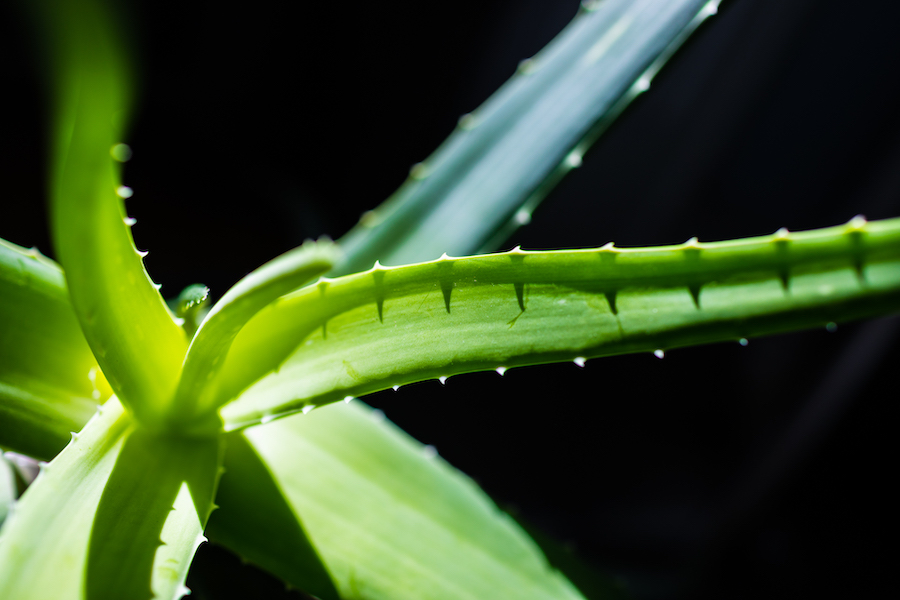I’ve often wondered if my cats are safe around the plants outside and I’m even more concerned about the plants in my home. After all, they’re curious little creatures, and if I’m not careful, they could get into something they’re not supposed to. That’s why I wanted to find out if it’s okay to let cats roam around my home with an aloe plant present. Read on to find out whether it’s safe to allow cats access to aloe plants and how to keep them safe.
Aloe plants are toxic to cats according to the ASPCA. If you think your cat may have ingested something it shouldn’t, contact a local veterinarian as soon as possible.

Aloe Vera houseplant by PilotChicago, license: CC BY-SA 4.0
What Makes Aloe Plants Toxic to Cats?
As a cat owner, I know how curious cats can be. While they may not seek out toxic plants to eat, they do have a tendency to chew on things they find attractive, like aloe plants. Unfortunately, aloe plants can be toxic to cats if ingested.
The toxic component of aloe plants is saponins, which are a type of chemical found in some plants. Saponins can cause severe gastrointestinal upset and even vomiting if ingested by cats. In some cases, saponins can also damage the liver and kidneys, leading to more serious health issues.
The good news is that aloe plants are not toxic in very small amounts, so if your cat does manage to get into the aloe plant and eats a small bit, it should be fine. However, if your cat ingests a larger amount of aloe plant, it may become sick and should be taken to the vet immediately. It’s best to keep aloe plants out of reach of cats to avoid any potential problems.
Symptoms of Aloe Plant Poisoning in Cats
It’s important to be aware of the signs of aloe plant poisoning in cats. Symptoms can range from mild to severe and can even be fatal if left untreated.
The most common symptom of aloe plant poisoning in cats is vomiting. If ingested, cats may vomit up any pieces of aloe plant they have eaten. This can also be accompanied by other gastrointestinal symptoms, such as diarrhea, abdominal pain, and decreased appetite. In more severe cases, aloe plant poisoning can cause neurological symptoms, such as seizures and tremors. It can also cause lethargy, an irregular heartbeat, and difficulty breathing.
If your cat has ingested aloe plant, it’s important to seek medical attention right away. Even if your cat is not showing any symptoms, it’s important to call a veterinarian for advice.
Prevention Strategies for Cat Owners
As responsible cat owners, we must take all steps necessary to ensure our cats’ safety and well-being. To that end, it is important to know that aloe plants are toxic to cats, and to take the appropriate steps to protect our feline companions.
First, aloe plants should never be kept in areas where cats can access them. If you have an aloe plant in your home, it should be kept in a place where cats cannot access it, such as a high shelf or hanging basket. If you keep aloe plants outdoors, make sure they are fenced off, or that cats do not have access to them in any way.
Second, it is important to regularly inspect your aloe plants for signs of damage or tampering. Aloe plants contain a toxic sap, and if your cat were to ingest it, the consequences could be damaging. If you see any signs of damage to the plant, such as leaves that are chewed, wilting, or discoloration, it is important to replace the plant immediately.
Finally, it is important to be aware of the signs of aloe toxicity in cats. If you suspect that your cat has ingested aloe sap, look for signs such as vomiting, diarrhea
Alternatives to Aloe Plants for Cat Owners
As a cat owner, it can be a bit more difficult to find a safe and beautiful plant to keep in your home. Aloe plants may be off-limits, but there are still plenty of wonderful and safe options.
For starters you can grow cat grass at home. It is appealing to your cat, easy to grow, and much cheaper and better quality than if you were to purchase it.
Ferns are a great choice because they are incredibly easy to care for and come in many varieties. Some ferns need more sunlight and water than others, so it’s best to do some research before buying. As long as you double check the variety (true ferns are safe but imposters may note be!) ferns make a great addition to any home.
Another excellent option is a spider plant. These plants can tolerate some neglect and I love that they are easy to propagate, which means multiple plants to spread around your home. Spider plants are safe for cats, so you can enjoy their beauty without worrying about your pet. And, as an added bonus, spider plants are also known for their air-purifying properties.
